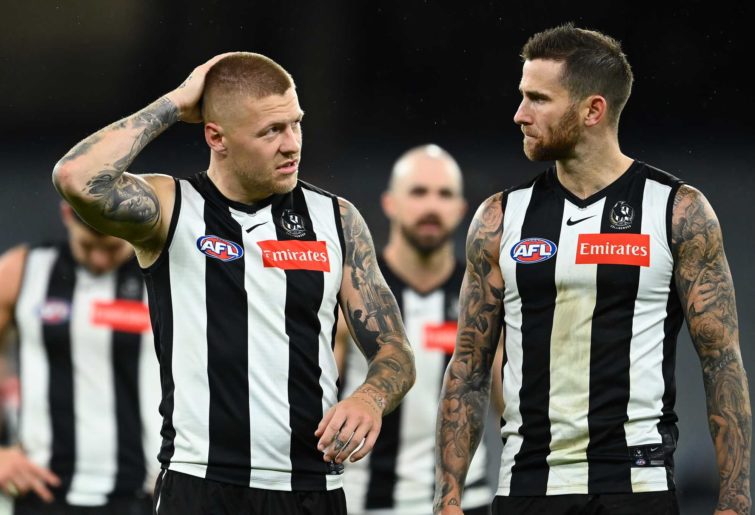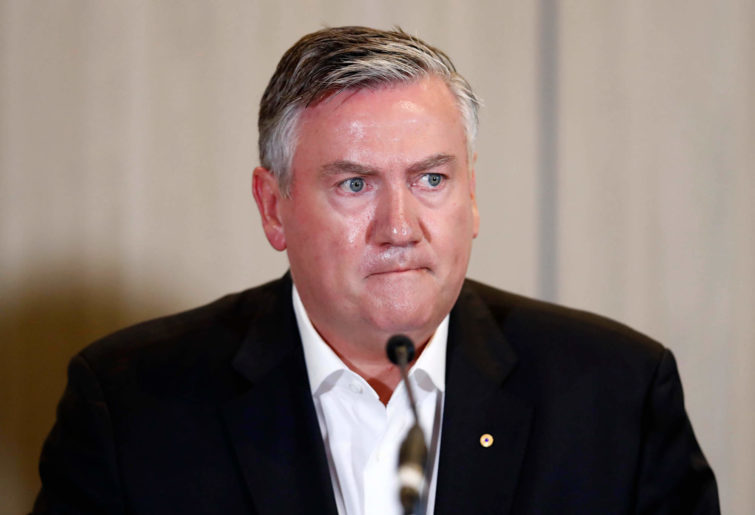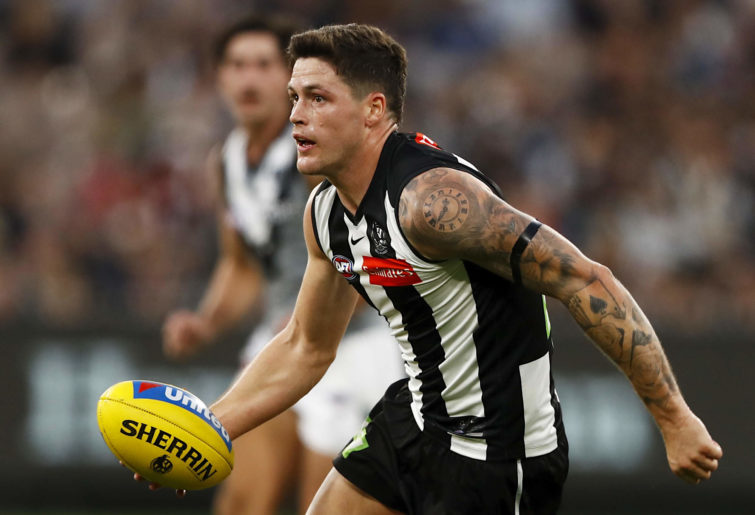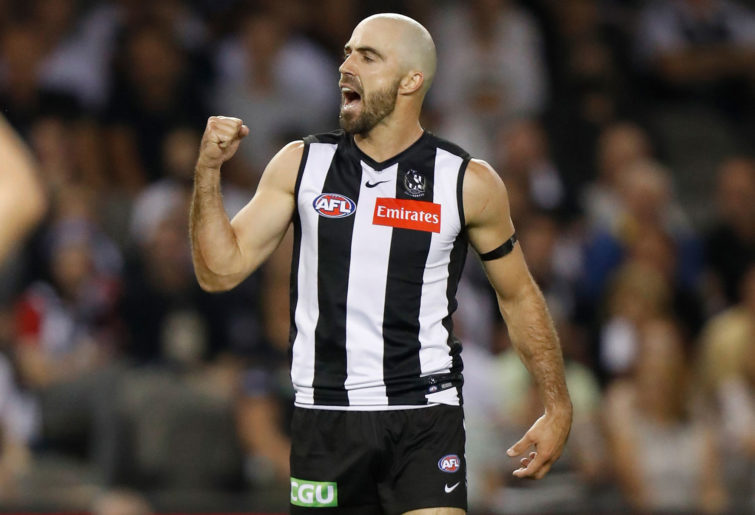Still nobody’s publicly offering a vision for Collingwood’s future.
So I’m going to go first. But I’m not going to talk about the now. Collingwood’s problems are bigger than the now, stemming from a generational psyche that informs the present and sees us repeat the mistakes of the past.
Here are the ten things I’d address if I were in charge.
10. Acknowledge the problem
We’re not a great club; we’re a club with a great history. There’s a profound difference.
Since 1958 we’ve won just two flags – two in 63 years. That makes us more successful than St Kilda and as successful in the same time as the Western Bulldogs and the Sydney Swans.
Comparatively, in that same time Hawthorn has won 13 flags; Carlton and Richmond eight; Essendon six; Geelong, West Coast and North Melbourne four; and Brisbane and Melbourne three.
That’s the reality when you put it in context.
This perpetuation of Collingwood’s greatness only gets in the way of the club finding that edge to go above and beyond. Why bother when you celebrate being the greatest for simply existing?
We’re not a great club anymore.
Problem acknowledged.

(Photo by Quinn Rooney/Getty Images)
9. Prioritise what the club is about
In the last ten years the club has seemed to be more about philanthropy than anything else. Ex-president Eddie McGuire even said football wasn’t just about premierships.
I appreciate clubs have the power to do a lot of good – from charitable work we punters never hear about to positively impacting the community and to grooming footballers into also becoming upstanding citizens who’ll have productive lives once their careers are done.
But the goal is always premierships.
Anybody who doesn’t have premierships at the top of their list and isn’t working to make that a reality should be shown the door.
8. Change the narrative
I’m sick of all the excuses about why Collingwood has failed at the final hurdle. I’ll use the 1979 grand final as an example: Wayne Harmes tapped the ball in (allegedly) from outside the boundary, leading to a Ken Sheldon goal.
To this day people still lament this – even though the goal didn’t put Carlton in front; they were already in front. Eddie McGuire still tells fairytale of the ball being out of bounds with pride.
Years ago I read Carlton great Wayne Johnson’s autobiography. He talked about the incident and said the Collingwood players gave up the chase, expecting the ball to go out, while Harmes chased it fanatically to keep it alive.
That’s the real difference.
How many of these stories exist at Collingwood? They’re recounted with a sense of martyrdom. When you make excuses you qualify losses – “We would’ve won, but…” – you don’t accept the simple truth. We weren’t good enough.
So change the narrative about these losses. Instil within the club the reality that we need to get better rather than the belief that we would’ve won if not for circumstances – read: excuses – which always provides a safety net.
We need to be afraid of failing unconditionally if we’re going to succeed.

(Photo by Darrian Traynor/Getty Images)
7. Take the ego out of the club
Collingwood is such a blustery club that we could power a yacht in the America’s Cup to victory by the length of the Atlantic Ocean. But what’s there to bluster about?
We don’t lead the premiership tally, we don’t have the most members, everybody has similar facilities now and the only two records we can boast about are the four-peat (the 1927–28–29–30 flags) and that we’ve lost more grand finals than anybody else.
We have this attitude of superiority that has been handed down generationally – a superiority that has transformed into a burdensome entitlement.
The reality is that our forebears could justifiably celebrate when we were sitting on 11 flags in 1936, when we were regularly making grand finals and nobody was near us, but in the here and now the landscape has changed, yet our attitudes remain the same.
This is why people loathe Collingwood. It’s not out of envying success – because there’s precious little of it in the modern era – but bemusement at how mightily, if not pompously, we hold ourselves.
We’re the bully who swaggers around until somebody stands up to us.
Cue grand final.
6. Kill the messiah complex
We’re always about [inster big name], who is going to save us. We see it currently in relation to Jeff Browne. He’s told us nothing about his vision for Collingwood, he’s said nothing about his plans for the future, and yet despite this platform of nothing, we gravitate to him because his profile fills a vacuum.
If you’re buying that narrative of silence, you probably haven’t thought much about what the club needs. As a sidenote, yes, I believe the incumbents also need to offer a vision.
Now we also see this attitude in relation to our next coach.
It has to be a big name. Collingwood cannot possibly entertain an untried coach. It has to be somebody proven with success behind them.
Do you know that since 2000 only five flags were won by what we’d consider a proven coach?
They are:
- 2000: Kevin Sheedy (Essendon);
- 2001-03: Leigh Matthews (Brisbane); and
- 2010: Mick Malthouse (Collingwood).
The rest have been new coaches:
- 2004: Mark Williams (Port Adelaide);
- 2005: Paul Roos (Sydney);
- 2006: John Worsfold (West Coast);
- 2007: Mark Thompson (Geelong);
- 2008: Alastair Clarkson (Hawthorn);
- 2009: Mark Thompson (Geelong);
- 2011: Chris Scott (Geelong);
- 2012: John Longmire (Sydney);
- 2013-15: Alastair Clarkson (Hawthorn);
- 2016: Luke Beveridge (Western Bulldogs);
- 2017: Damien Hardwick (Richmond);
- 2018: Adam Simpson (West Coast); and
- 2019-20: Damien Hardwick (Richmond).
So roughly 75 per cent of flags have been won by coaches in their first gig – discounting Kevin Sheedy; Sheedy was 20 years into his first gig when Essendon won in 2000. For the sake of argument, let’s accept him as proven.
A proven coach doesn’t guarantee success. We saw that with Mick Malthouse at Carlton, John Worsfold at Essendon, Ross Lyon at Fremantle – well, there are plenty of examples.
That’s not to say a proven coach isn’t the way to go, but don’t do it for the sake of doing it.
Pleasingly, in an article Michael Gleeson wrote for the Age on 13 June, Collingwood football director Paul Licuria said every candidate would go through an exhaustive interview process, and then the club would make a decision.
This will be the only time such a process has been employed at Collingwood.
Kill this need for a big profile to save the club – it just fits into the typical Collingwood narrative of bluster and ego and that belief that if we just get that right identity, everything will click into place.
Hey, guess what? It’s never happened.
Jesus couldn’t have saved this club from itself.

(Photo by Dylan Burns/AFL Photos via Getty Images)
5. Stop being precious
As supporters we might deride opposition clubs, we might hold certain clubs in low regard, but you know what? The players love their clubs unconditionally.
Who can forget Brendon Goddard’s first appearance for Essendon against St Kilda and the emotional post-game interview he gave? This is a guy who’d gone from one of the most unsuccessful clubs ever to one of the powerhouses, and yet he still had that love for his original club.
The point? All clubs are equal (as homes) in the eyes of players. It’s not like the best players are trying to gravitate to Collingwood, Richmond, Hawthorn or whoever because of their stature. They play where they play and generally love it and respect that club.
So can we stop being precious about Collingwood, like we’re the only club in existence?
An example is Port Adelaide wanting to wear their SANFL Magpies jumper. Who cares if they wear it once a year? Back in June of last year I wrote about how Collingwood and Port Adelaide could turn their jumper tussle into an exciting rivalry.
Can we stop clawing onto tradition when the alternative represents opportunity and evolution?
There are always beneficial new pathways to be explored.
4. Focus and balance
I accept that every now and again players are going to mess up off the field. These are young people still finding their way into adulthood. They have lots of money, spare time and celebrity. It’s actually a credit to players and clubs that this doesn’t happen more often.
But everybody else should be focused on the prize: flags. Celebrate success, compartmentalise it, but maintain a balance and then refocus.
Something that has infuriated me in a lot of my time following Collingwood is the constant noise coming from off-field identities. Allan McAlister did it in the second half of his tenure. Eddie McGuire did it constantly; Caroline Wilson even took a shot at him about it during an episode of Footy Classified last year, a reflection on how such outbursts can impact on-field fortunes.
As a player, I cannot reconcile how distracting it would be to have this chatter flaring up in the background, bringing the club under unnecessary scrutiny and taking focus away from on-field endeavours.

(Photo by Michael Willson/AFL Photos via Getty Images)
3. Stop comparing down
I get in a lot of arguments when I say this stuff. The rejoinder always is something like, “Would you rather follow St Kilda?”. This is how we make ourselves feel better – by comparing ourselves to clubs who haven’t had the success or don’t enjoy the stature we do.
What does that achieve? It genuinely sounds like somebody suffering an inferiority complex trying to find a way to feel better about themselves.
In the modern era Hawthorn is the most successful club. In the new millennium Hawthorn, Richmond, Geelong, Brisbane, Sydney and West Coast have all been more successful than Collingwood.
Use the best as your benchmark.
2. Stand united
People might assume that a club is automatically united by virtue of working for the same organisation. I query whether this has been the case at Collingwood for a while now.
In any organisation you employ people because of their specialised skill set. They can do something better than anybody else can, and they should be given the liberty to exercise their skill set. Obviously they’re answerable to a superior, but a club is about more than a single individual.
To win flags, to enjoy success, every single part of that organisation has to be hitting their mark day in, day out, week in, week out.
There is no room for egos, dictators or schisms.
There should be room for robust discussion, to challenge ideas and even for disagreements, but at the end of the day everybody should be contributing their expertise to the harmony of trying to realise that singular vision.
1. Who are we?
One thing I appreciate the club is trying to do is reconnect with its fan-base. Once Collingwood moved from Victoria Park we lost some facet of our identity.
In 2001 the club inverted the colouring on their jumper so it had a black base – regardless of what you’re told, Collingwood has never worn this jumper. There have been variations on stripe sizes et cetera, but the jumper has always had a white base.
More and more throughout the 2000s the club became this corporate entity – a friend once called it the McGuirisation of Collingwood.
Clubs grow, evolve and change, but at Collingwood there’s been a marked shift that belies our working class roots. You can’t hold onto that identity when you’ve moved so far away from it. It’s fine to forge a new identity, but what exactly is it?
The last point, simply, is to work out who we are.
Conclusion
This is Collingwood’s heart attack moment – this is when the club has had the scare of the lifetime, faced their mortality and should realise that they need to start doing things differently.
Everything we’ve known hasn’t worked. Over and over. It’s led to moderate success, but surely this club – every club – wants to be bigger than that.
With Collingwood, it begins with our own self-perception.
































































































